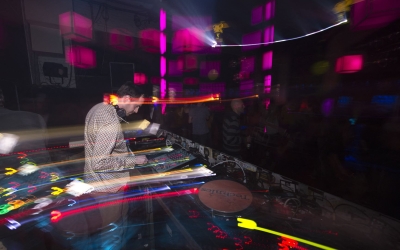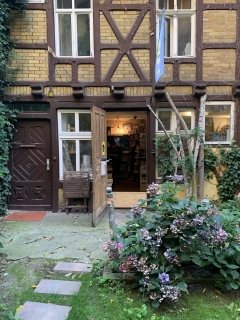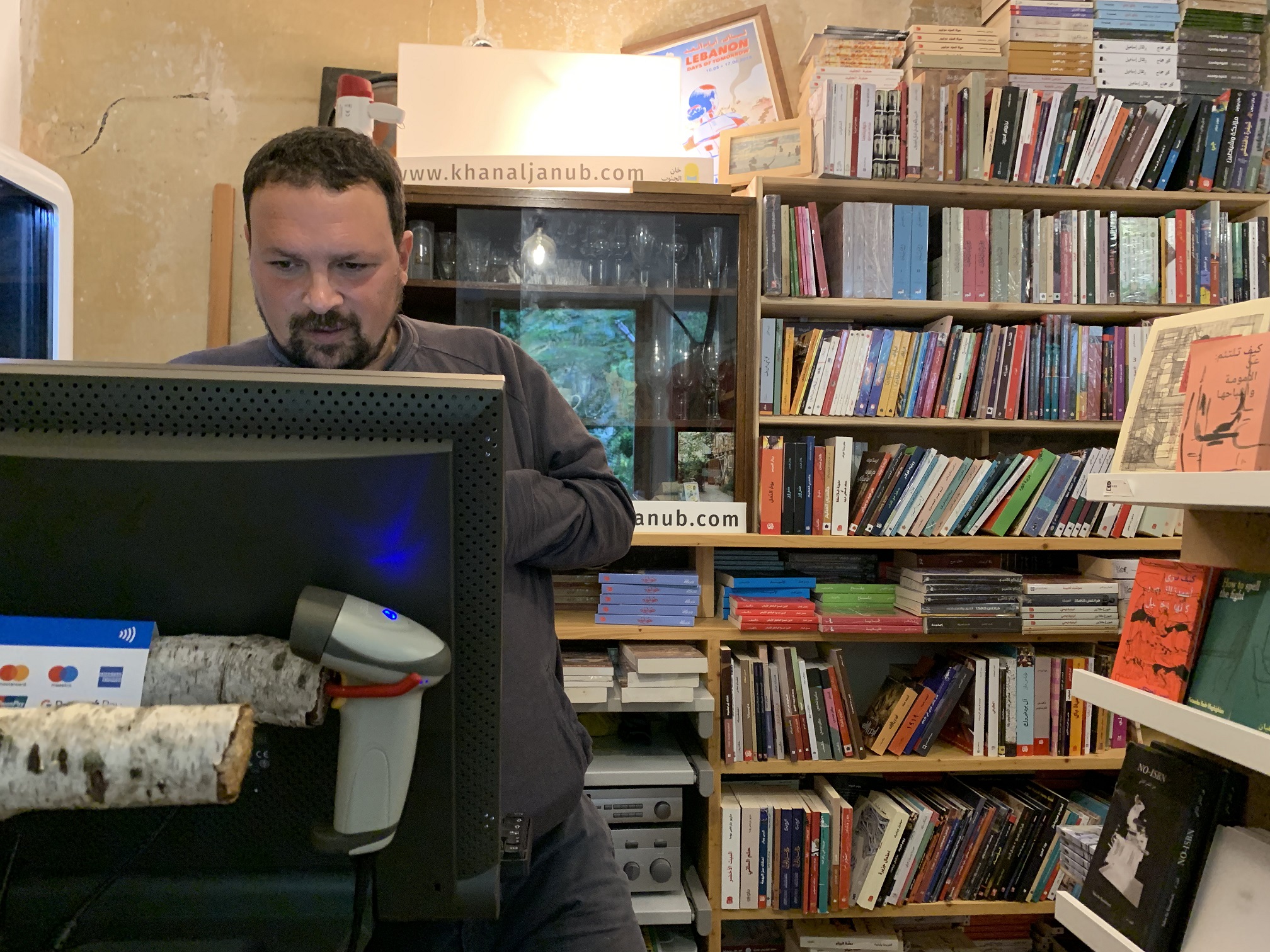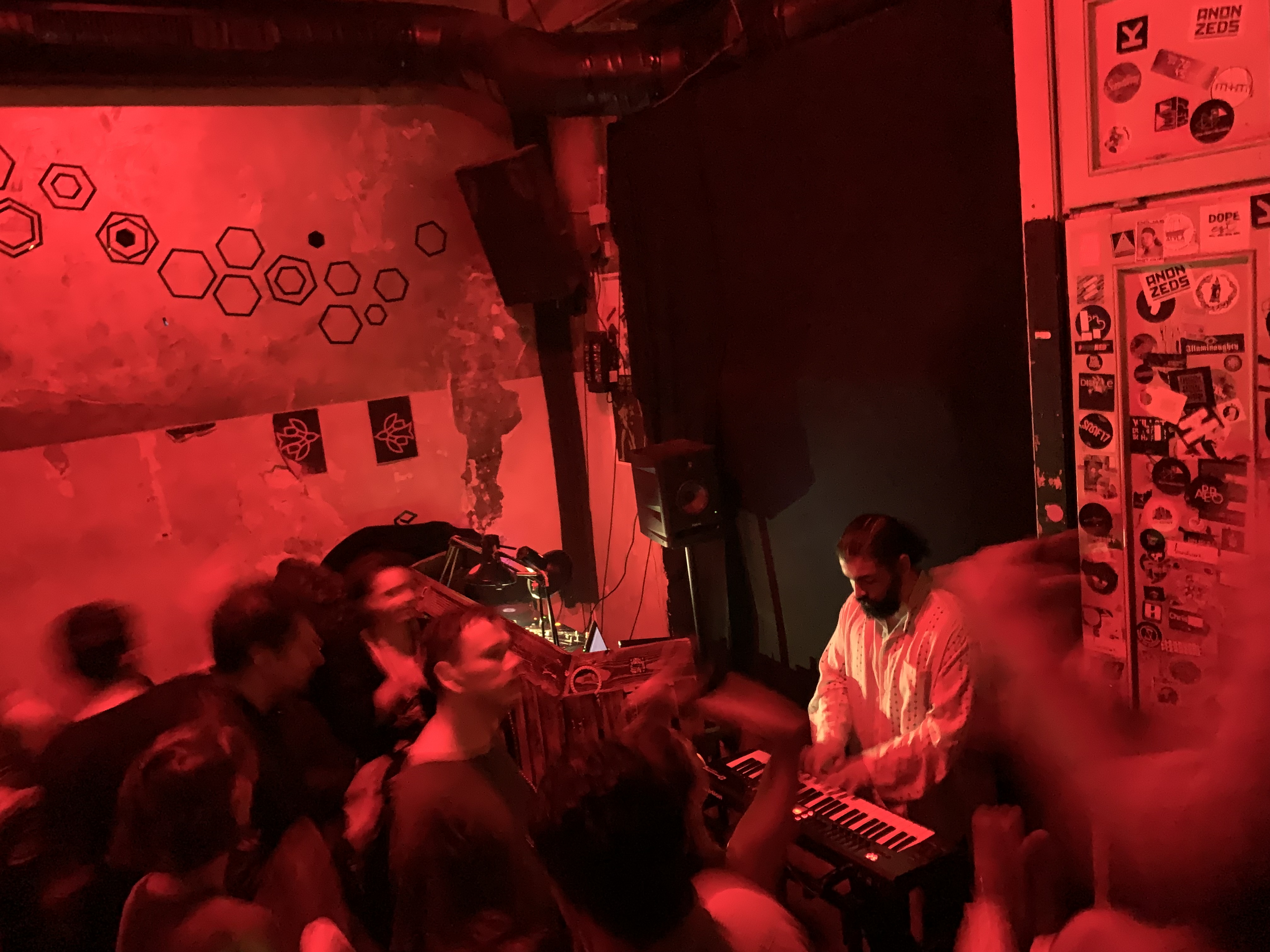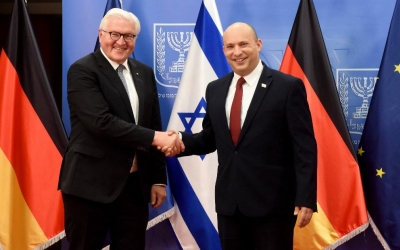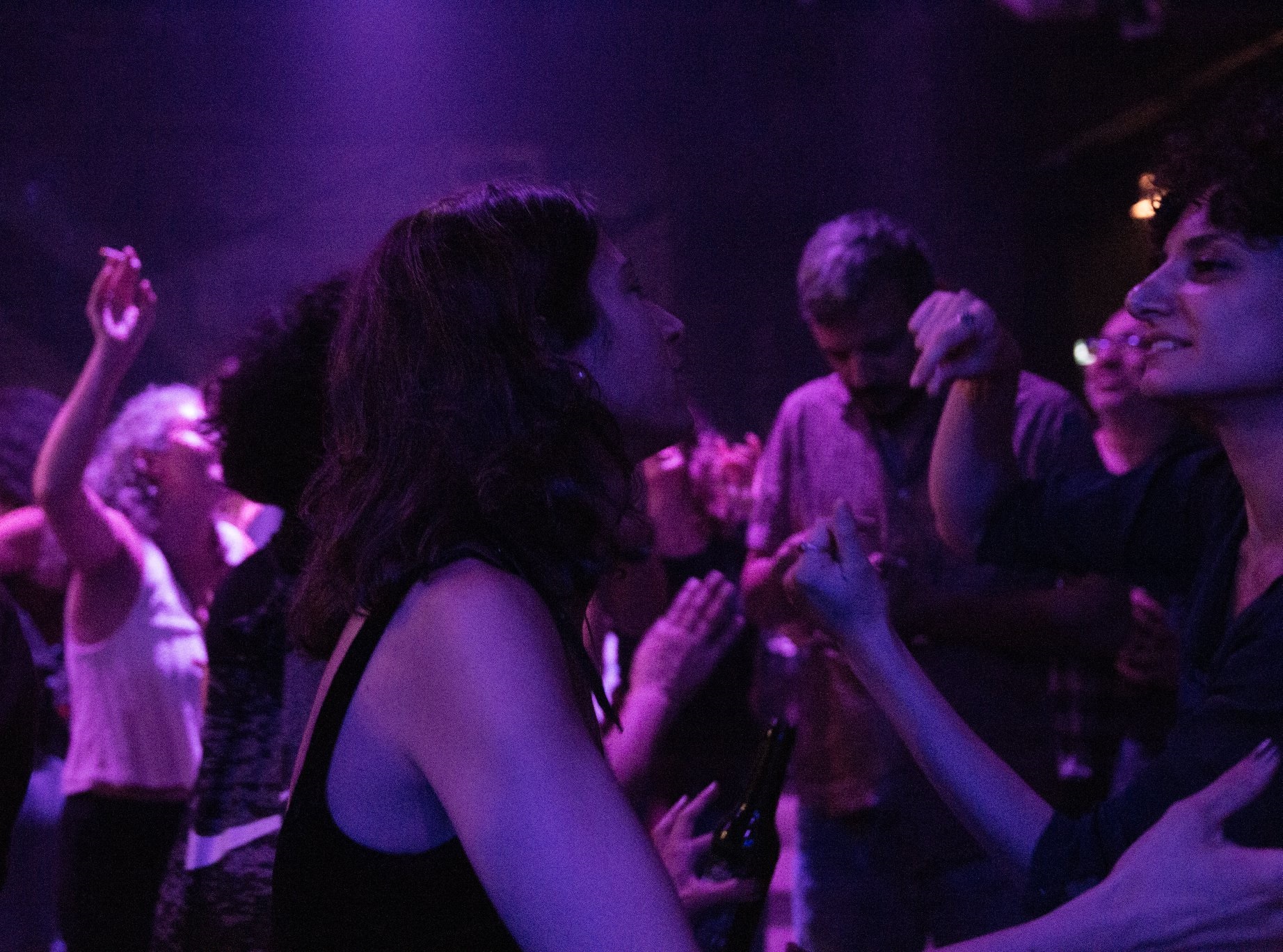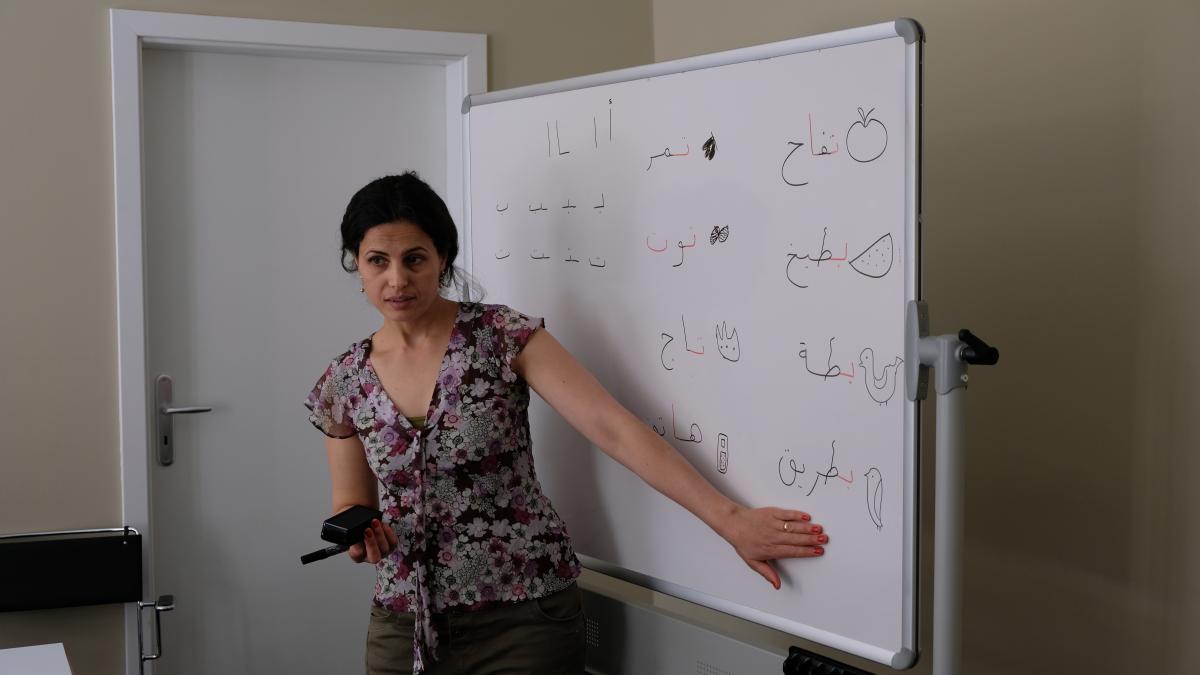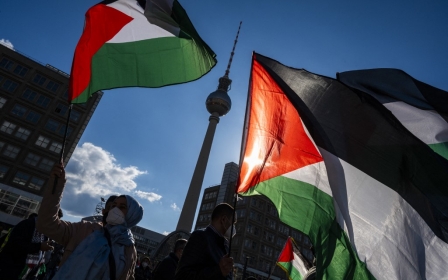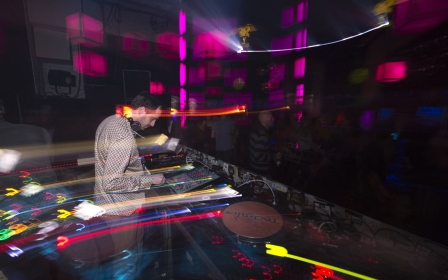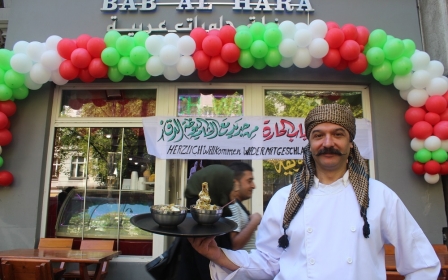Berlin: Inside Europe's capital of Arab culture
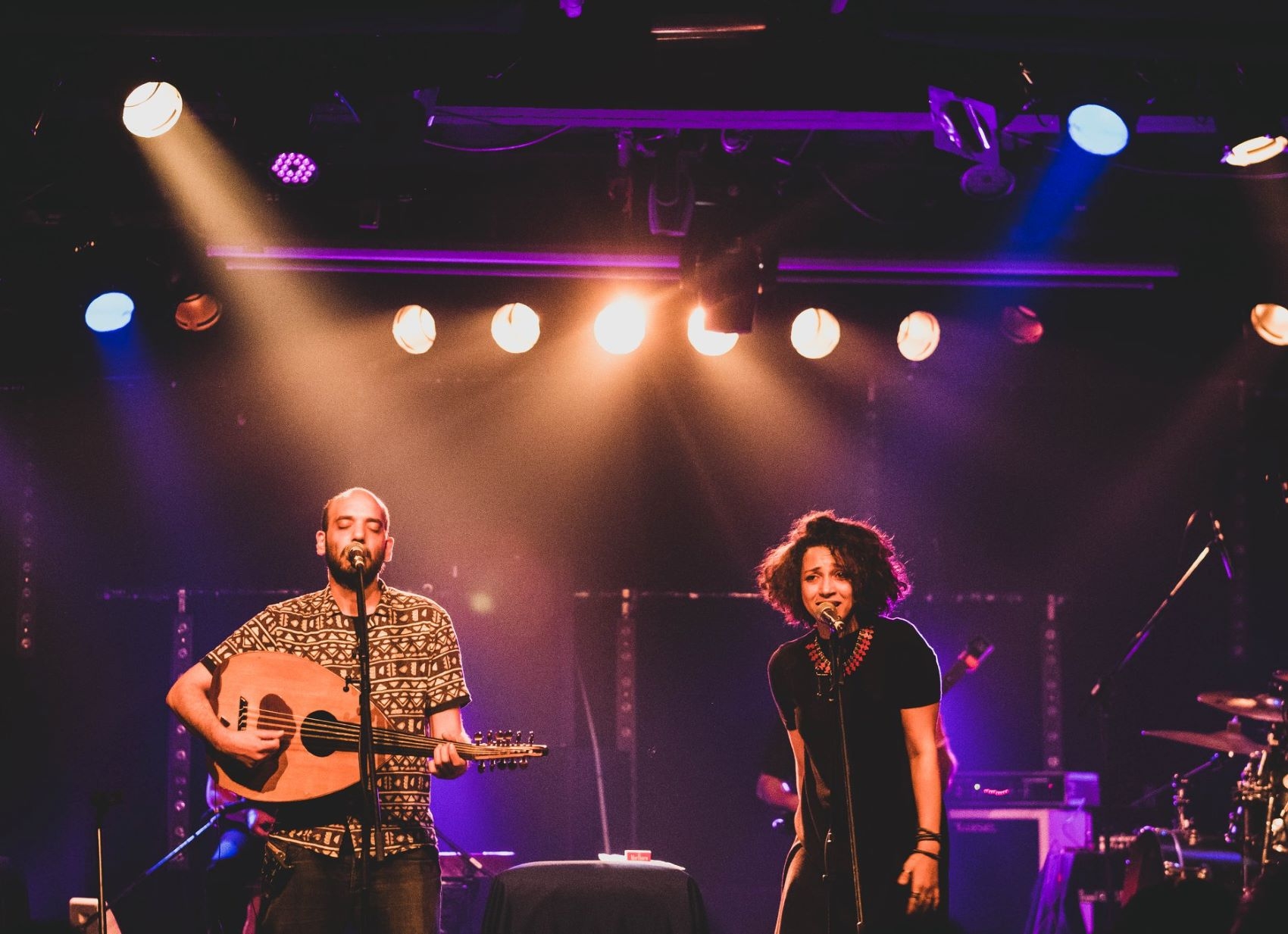
On a Friday afternoon in Berlin, you might find Fadi Abdelnour rolling a cigarette underneath a tree in a Schoneberg backyard. Between phone calls and sips of lukewarm tea, he’ll wave at young Syrians and Egyptians making their way through the courtyard into Khan Aljanub, an Arabic-language bookstore he opened with two friends in February 2020.
Khan Aljanub sits on a nondescript section of Potsdamer Strasse, an important road that cuts through West Berlin and connects the historic square Potsdamer Platz with one of Germany’s biggest parks, Tiergarten. Malakeh, one of Berlin’s best-known Syrian restaurants, is a few metres down the road.
New MEE newsletter: Jerusalem Dispatch
Sign up to get the latest insights and analysis on Israel-Palestine, alongside Turkey Unpacked and other MEE newsletters
To reach the bookstore, customers ring the bell by a tall, blue wooden door before being let inside, passing the rear entrance of the Moroccan restaurant next door before being greeted in the courtyard by Abdelnour or his colleague Mohammed.
Inside Khan Aljanub sit 3,500 books from across the Arab world, mostly sourced from Beirut or Cairo, either shipped by distributors or hand-delivered by friends after their travels abroad. There are books on philosophy, sociology, history, classics and modern and experimental fiction - the zeitgeist of Arabic literature.
The current bestsellers are the Palestinian author Majd Kayyal’s Death in Haifa, Rasha Abbas’s The Invention of German Grammar and The Official History of the Gods of Egypt by Mohammad Rabie, the bookstore's Egyptian co-founder.
One corner hosts a small English and German section with a handful of translations from Arabic. Behind the sales counter, there’s a coffee machine and a fridge stocked with beer, which Abdelnour and Mohammad Rabie crack open on Friday evenings.
Abdelnour says the store’s customer base is around several hundred people and growing. About 30 percent are repeat visitors who heard about the store through word-of-mouth or its Arabic-only social media channels. Most customers weren’t born in Germany, but are Arabs who resettled in Berlin in the past decade, particularly since 2015.
Relatively recent arrivals like these are driving a well-documented surge in Arabic-language events throughout Berlin, an uptick in activity that also includes theatre, poetry nights, cultural and politics conferences, gay parties, drag shows, raves and film festivals.
This explosion in activity has led to the creation of what is arguably Europe’s most vibrant Arabic-language cultural scene. But while this scene is busier than ever, it’s the culmination of a decades-old movement with roots in local restaurants and university student halls previously hidden from public view.
The Germans have taken notice. In July, former Greens federal minister Renate Kunast stopped by Khan Aljanub to show her support. Local journalists have dropped in to interview Abdelnour.
From private to public
“When I arrived in 2002, there was a lot of activity, but no central meeting places,” Abdelnour says, leaning back on a wooden garden chair.
“There were 300 faces, and 50 of them would be everywhere: political events, lectures, music. Some would do parties the same way, for example, like they would in Lebanon... a get together with dabke and political speeches. Then there were more intellectual gatherings, like lectures.”
Where these events were once confined to whatever offbeat venues its participants could find through friends and family, like Prenzlauer Berg’s Al Hamra bar, they’re now out in the open, increasingly backed by official funding from German academic and cultural institutions. Berlin’s Senate Department for Culture and Europe and the non-profit Rosa Luxemburg Foundation sponsor Arabic-language film festivals, music and literature events, and conferences about issues in the Middle East.
This activity has been analysed in theses, conferences and documentaries in Berlin and abroad, including by the Egyptian-Australian sociologist Amro Ali, whose 2019 essay On the Need to Shape the Arab Exile Body in Berlin finally gave a name to something that had been brewing for years.
“The numbers are too great for something not to happen,” Ali told MEE on the phone. “The Arab exiles here have more institutional support than you’d get in, say, London or New York. Irrespective of their agenda, intentions or racism, you can easily get funding. There’s a pro-art, pro-social sciences government."
The same qualities - cheap rent, an openness to creativity - that have drawn international artists, musicians, writers and intellectuals to Berlin for decades have also attracted tens of thousands of people from the Arab world. These include refugees originally assigned to other German cities, but who through sheer determination made their way to the capital.
“Traditionally, the Mecca for Syrians was Paris,” Syrian playwright Liwaa Yazji told Exberliner earlier this year. “But now, I feel like the younger generation is coming to Berlin.”
Many new arrivals to Germany, as Amro Ali wrote, bring along their love of music and literature, eventually setting up events or initiatives of their own. Among them is the Arabic Music Institute, a music school that teaches Middle Eastern instruments like the oud and the darbouka, plus Arab music theory and choral singing. A trio of activists and musicians from Syria and Jordan also founded Baynatna, an Arabic-language library and cultural centre, in 2016.
'In the past, Arabic was usually only for the mosque and religious communities'
- Mirvat Adnan
Then there’s ALBerlin, a bar and cafe in the city’s trendy Kreuzberg area. Its co-founder, Muhammad Jabali, is a Palestinian from Haifa. He moved to Berlin three years ago, when his wife secured an academic placement at a local university. He got his start in the city by founding a music initiative that flew in Arab musicians for concerts.
In 2019, at the first edition of the ALBerlin music festival, they booked the Egyptian singers Maryam Saleh, Tamer Abu Ghazaleh and Maurice Louca at YAAM, a sandy, riverside club best known for reggae and hip hop. ALBerlin held nine other events throughout that year, booking 28 acts who played for a total of 1,800 attendees.
They opened the ALBerlin bar last February, a few weeks before the first Covid-19 lockdown closed every cultural space in Germany. (Most in the scene will remember the infamous date, March 14, forever.) Despite financial losses, they were able to keep afloat and will host the second edition of the ALBerlin festival later this year.
Today, as Berlin’s cultural scene edges back to normality, ALBerlin operates a cafe, bar and, sometimes, like on their monthly Friday night Arabic pop nights, something resembling a club.
Catering to a growing population
On a typical Saturday evening, staff members swap stories of the previous night’s party, which stretched well past midnight, while the room slowly fills with guests speaking a mixture of German, English and Arabic. Customers aged mostly from their early 20s to mid-40s, ordered beers, Aperol spritzes and, occasionally, the Levantine spirit Arak while the bar queue steadily grew.
At ALBerlin, young Syrians mix with Tunisians, Egyptians meet Palestinians - a mischung, as the Germans say.
With space for around 70 people, ALBerlin doesn’t take long to feel busy. The musical fare is deep and groovy, a mixture of jazz and broken beats, spun from a wooden DJ booth in the corner by DJ Ioana, a longtime customer who had been invited to play her first set at the venue when MEE visited.
The next evening hosted a Tunisian-themed pop-up food stall, where a cook served up brik, a deep-fried pastry dish, while a DJ played tunes in the courtyard.
On Sundays, before the coronavirus lockdown, there were even Arabic lessons for kids, mostly the children of the founders and their friends. “One of the only secular Arabic classes for children in Berlin,” Jabali says outside the bar with a grin, hunched under an umbrella.
With long hair and a thick moustache, it’s easy to picture Jabali behind the DJ booth. He’s also a children’s book author, and threw parties for years in Haifa. Like Abdelnour, the bookshop owner, he’s certain that his bar is merely an extension of foundations laid years ago, and that cities like Brussels and Amsterdam are also experiencing an uptick in Arabic-language events.
“There are simply more Arabs in Berlin now, so it’s bigger and more noticeable,” Jabali says. “It’s elitist to say what we’re doing is new and what was happening before wasn’t cultural.”
From the backstreets
For years, though, those events, and the Arabic language, were hidden from public view, most visible in the area around Sonnenallee, a famously Arab street.
Mirvat Adwan, one of the two Syrians behind Berlin’s first privately run Arabic school, Kalamon, has witnessed this change. A Berliner since 2007, she’s seen the city’s Arabic-speaking population boom, particularly since 2015.
“In the past, Arabic was usually only for the mosque and religious communities,” Adwan says. “The authorities didn’t try to do much for the Arab community here, which is why Arabic speakers started to do events for themselves.”
The Berlin authorities don’t publish detailed language statistics, but the number of Arabic speakers could be higher than 150,000. There are at least 40,000 Berliners with Syrian citizenship, third only behind Turkish and Polish citizens.
They include some of more than one million people, mainly from Syria, who applied for asylum in Germany in 2015 alone. Less known is that 80,000 came to Germany between 2011 and 2014, many resettling in Berlin. In those years, the German government sought out individuals it deemed persecuted, including many writers, journalists and artists.
Prominent Arab activists like Saudi Arabia’s Ali Adubisi, Syria’s Wafa Mustafa and Anwar al-Bunni, along with countless Palestinians and Egyptians, have all made a home in Berlin.
‘There are limits’
“I wouldn’t glorify Berlin as a safe refuge,” Marwa Fatafta says on the phone from Hamburg.
The Palestinian journalist and activist moved to the habourside German city a few months ago after seven years living in Berlin. Currently the MENA policy manager at the digital rights non-profit Access Now, she came to the German capital from Ramallah during the 2014 Gaza War and has since become a well-known speaker and online commentator. But even in Berlin, a city you could call Europe’s capital of Arab culture, there are limits.
“It’s very hard to find a safe space to publicly discuss issues that affect our present and future,” Fatafta says. “Whether that’s Israel or living as Arab migrants among racism and Islamophobia in Germany. There’s often some disturbance, like pressuring the organisers to cut the funding or cancel speakers.”
You also can’t open a bookstore without having your politics questioned, as Fadi Abdelnour found out when a journalist grilled him on his stock’s stance on Israel-Palestine.
These limits apply to more than books and political conferences about the Middle East. Even well-intentioned arts organisations tend to have a hollow view on what films, for example, from the Arab world to showcase: priority often goes to those that fit a Eurocentric view of the region, particularly topics like war and the oppression of women.
For years, Abdelnour helped curate ALFILM, an Arab film festival held annually since 2009. ALFILM hosted its 12th edition online in April, and put on several summer screenings of the Palestinian film 200 Meters and Tunisian film The Man Who Sold His Skin at open-air cinemas.
Abdelnour, who has stepped away as an organiser but still designs the festival’s flyers, launched ALFILM with friends as a way to wrestle the narrative away from Eurocentric curators and organisations.
“A lot of content back then was very orientalist or concentrated on social realism,” Abdelnour says. “They didn’t want to see, say, an Egyptian love story, because to them it’s not authentic. The absence of this diversity is what moved us to start a festival of our own.”
‘It’s our home’
Where ALFILM is outward-facing, screening Arabic-language films with English or German subtitles, the bookstore Khan Aljanub is not. All online communication is in Arabic and visitors see very little German or English once they get inside. If you’re not an Arabic speaker, there’s little at Khan Aljanub for you, something that speaks to the size of the store’s potential customer base.
So far, it’s been hard to attract members of Berlin’s mostly Lebanese and Palestinian old-school Arab community, which has been a part of the city’s fabric for decades. Abdelnour puts this down to several reasons, including that these Arabic speakers, and their children, likely speak German very well, and don't usually seek out books in Arabic. And if they are interested in Arabic literature, it’s probably not the contemporary stuff for sale in his shop.
“Most of the books don’t interest the people who have been living here for decades,” Abdelnour says. “They ask for books that haven’t been in print for 50 years.”
This moment in time, in a city full of recent arrivals bringing the issues, music and discourse surging through the Middle East and North Africa, won’t last forever. In five, 10 or 20 years, the children of these Berlin-based activists, writers, musicians and academics will speak fluent German, and might be more interested in, say, hip-hop or techno than the latest Egyptian dance music.
That’s all the more reason, according to sociologist Amro Ali, to lay down long-lasting roots. “The activities at the moment tend to be very fleeting,” he says. “As much as I love art exhibitions and conferences, they come and go. We need physical spaces, a fulcrum point. And if you want to be part of this movement, you come to Berlin.”
In the coming years, as the Arabic-language cultural scene grows, its influence will creep even further into mainstream German life, whether it’s through increasing appreciation for Arab film and music or the deeper political issues aired at the growing list of annual conferences and panels. The Khan Aljanub bookshop will soon publish a book that’s too political to be released in the author’s home country, Egypt.
Many students at Kalamon, the Arabic school, are Germans without any connection to the Arab world. And like the customer base at Khan Aljanub, their number is growing.
The Arabic language teacher Mirvat Adwan points to an increased appreciation for her culture from the state, reflected in the growing number of elementary schools offering Arabic classes to young learners, now up to 12 across the city.
“If the kids learn for 10 years, their Arabic should be quite good,” she says. “This movement will continue. It won’t stop.”
Marwa Fatafta, the Palestinian digital rights activist, still visits Berlin often and, despite its limitations, feels comfort in how the city’s Arab community and cultural scene has grown. “You don’t see this anywhere else in Germany,” she says. “It’s real, organised by people from the region, not big institutions.”
From electronic music to visual art, Berlin has been at the cutting edge of modern culture for decades. The musicians, club promoters, readers, writers and activists from the Arab world settling here have ensured that extends to their own corner of the city. As time goes on, more bookshops, music and language schools will open, further solidifying a scene that has existed in some form since Berlin’s first wave of Palestinians arrived in the 70s.
“I don’t have the luxury of picking up my passport and moving to the US or UK,” says Marwa Fatafta. “If you’re here, you have to make it work. It’s our home. It might be painful, but maybe we can change things for the better.”
This article is available in French on Middle East Eye French edition.
Middle East Eye delivers independent and unrivalled coverage and analysis of the Middle East, North Africa and beyond. To learn more about republishing this content and the associated fees, please fill out this form. More about MEE can be found here.


